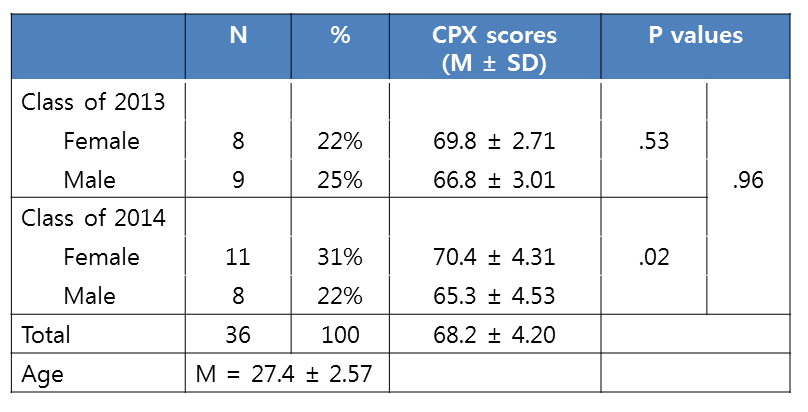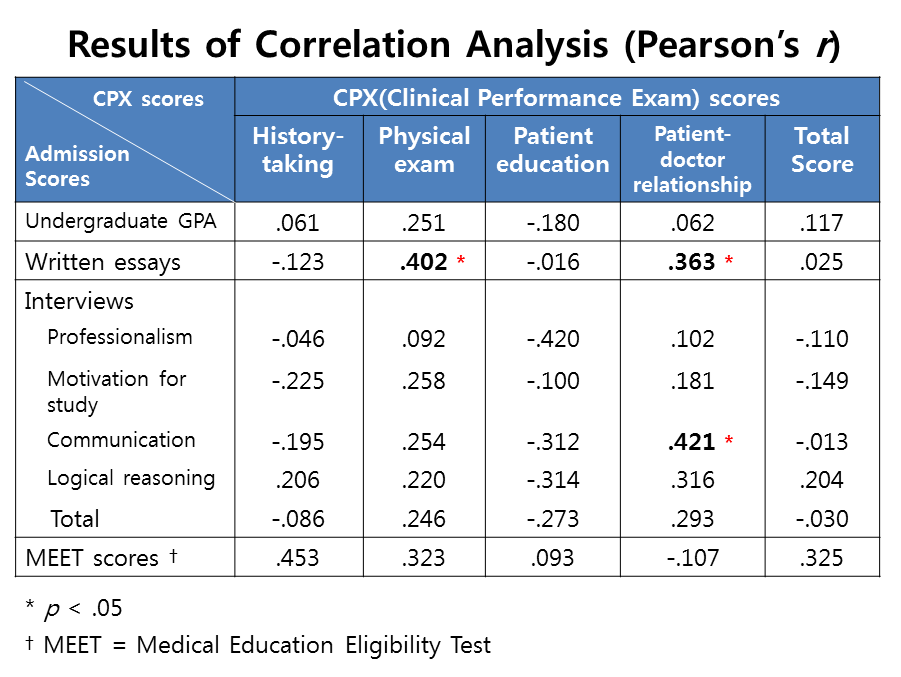
|
Authors | Institution |
|
Kyong-Jee Kim Hye Won Jang |
Dongguk University School of Medicine, Korea Sungkyunkwan University School of Medicine, Korea |
 |
|
||||||
| The association between medical students admission scores and their clinical performance |
Previous studies have identified cognitive and non-cognitive factors that are associated with medical students' academic performance. And, it is known that their relationships become weaker over time in their years in medical school. Still, research is scant on factors that are associated with medical students' clinical performance.
This study aims to identify whether medical students’ admission scores are associated with their clinical performance as a preliminary study for identifying predictors of medical students’ clinical performance.
Study Participants
Two cohorts of graduate-entry students (graduating classes of 2013 and 2014) at Syunkyunkwan University medical school (n =36) was studied. They were admitted in 2009 and 2010 in the four-year basic medical education program. All students in the cohorts agreed to participate in the study.
Respondent Demographics and their
CPX (Clinical Performance Examination) scores

Study Variables
Admission scores consisted of undergraduate GPA, written essays (i.e., statements of purpose), interviews, and the Korean Medical Education Eligibility Test (MEET) scores. The interviews assessed four areas - professionalism, motivation for study in medical school, communication skills, logical reasoning skills.
Students' clinical performance was assessed using the CPX (Clinical Performance Examination) method. The CPX was conducted at the end of the first semester of their fourth year for each cohort. The CPX composed of six stations, in which students were assessed of their clinical competencies in four areas; i.e., history-taking, physical examination, patient education, and patient-doctor relationship.
Data Collection and Analysis
Correlation analysis was performed to investigate relationships between their admission scores and their CPX scores. Additionally, Student t-tests were performed to examine differences in clinical performance between the two cohorts and/or between genders. All significance was tested at the 95% level of confidence.
Participants' Performance in CPX
Participants did not differ significantly in their total CPX scores across the different cohorts (t = .50, p = .96). Participants' CPX scores differed significantly across genders in one cohort only (t = 2.51, p < .05).
Relationships between Student Admission Scores and CPX outcomes
The student’s written essay (e.g., statement of purpose) score was significantly correlated with his/her physical exam and patient-doctor relationship scores in CPX (p < .05). In terms of interview scores, student communication skills scores were significantly associated with his/her patient-doctor relationship score in CPX (p < .05). Neither students’ undergraduate GPA nor MEET scores were significantly associated with their CPX scores.

Student performance in written essays and interviews for medical school admissions are more strongly associated with their clinical performance than with their academic achievement in undergraduate GPAs or medical school admission tests. A multivariate analysis with a larger sample is suggested to develop a model for predicting medical students’ clinical performance.
 Send Email
Send Email
